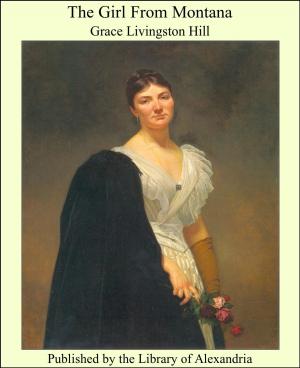The Invisible Foe: A Story Adapted from the Play by Walter Hackett
Nonfiction, Religion & Spirituality, New Age, History, Fiction & Literature| Author: | Louise Jordan Miln | ISBN: | 9781465604545 |
| Publisher: | Library of Alexandria | Publication: | March 8, 2015 |
| Imprint: | Language: | English |
| Author: | Louise Jordan Miln |
| ISBN: | 9781465604545 |
| Publisher: | Library of Alexandria |
| Publication: | March 8, 2015 |
| Imprint: | |
| Language: | English |
Helen usually was playing by herself, and pretending, as now, to be sharing the sport of some playfellow, perfectly tangible to her, but invisible, non-existent to the boys—a form of persistent “make believe” which greatly amused Hugh and as greatly irritated Stephen. “Don’t pretend like that; it’s a simpleton way of going on,” the older boy called to her now, without moving his head or his eyes. “It’s nothing of the kind,” the girl replied scornfully. “You’re blind, that’s what’s the matter—blinder’n a bat, both of you.” And she continued to laugh and chat with her “make-believe” playmates. An elfin child herself, the children of her own delicate myth did seem the more suitable fellows for her dainty frolic than either queer Stephen or stolid, clumsy Hugh. The little girl was very pretty, a queenly little head heavy with vivid waves of gold-red hair, curved red lips eloquent of the history of centuries of womanhood, wide blue eyes, and the prettiest hands and arms that even feminine babyhood (and English babyhood, Celtic-dashed at that) had ever yet achieved; every pink-tipped finger a miracle, and each soft, beautifully molded elbow, dimpled and dented with witching chinks that simply clamored for kisses—and often got them; a sunny, docile child, yielding but unafraid, quiet and reserved, but hiding under its rose and snow robe of provocatively pretty flesh, a will that never swerved: the strongest will at Deep Dale—and that says everything of it—for both Stephen Pryde, fourteen years old, and his uncle, nearing fifty, had stronger wills than often fall to us weak mortals of drift and vacillation. These two masculine strengths of will lay rough and prominent on the surface and also sank soul-deep. The uncle’s never abated. Circumstances and youth curbed the boy’s, at times—but neither chilled nor softened it. Helen’s will lay deep and still. Her pretty, smiling surface never showed it by so much as a gentle ripple. She kept it as a sort of spiritual “Sunday best” laid away in the lavender and tissue of her secret self. As yet only her old Scotch nurse even suspected its existence and of all her little, subservient world, only that old Scotch nurse neither laughed at Helen’s dream friends—nor scoffed. In her sweet six years of life her father’s will and hers had never clashed. That, when the almost inevitable clash of child and parent, old and young, cautious experience and adventurous inexperience, came, Helen’s should prove the stronger will, and hers the victory, would have seemed absurd and incredible to all who knew them—to every one except the nurse.
Helen usually was playing by herself, and pretending, as now, to be sharing the sport of some playfellow, perfectly tangible to her, but invisible, non-existent to the boys—a form of persistent “make believe” which greatly amused Hugh and as greatly irritated Stephen. “Don’t pretend like that; it’s a simpleton way of going on,” the older boy called to her now, without moving his head or his eyes. “It’s nothing of the kind,” the girl replied scornfully. “You’re blind, that’s what’s the matter—blinder’n a bat, both of you.” And she continued to laugh and chat with her “make-believe” playmates. An elfin child herself, the children of her own delicate myth did seem the more suitable fellows for her dainty frolic than either queer Stephen or stolid, clumsy Hugh. The little girl was very pretty, a queenly little head heavy with vivid waves of gold-red hair, curved red lips eloquent of the history of centuries of womanhood, wide blue eyes, and the prettiest hands and arms that even feminine babyhood (and English babyhood, Celtic-dashed at that) had ever yet achieved; every pink-tipped finger a miracle, and each soft, beautifully molded elbow, dimpled and dented with witching chinks that simply clamored for kisses—and often got them; a sunny, docile child, yielding but unafraid, quiet and reserved, but hiding under its rose and snow robe of provocatively pretty flesh, a will that never swerved: the strongest will at Deep Dale—and that says everything of it—for both Stephen Pryde, fourteen years old, and his uncle, nearing fifty, had stronger wills than often fall to us weak mortals of drift and vacillation. These two masculine strengths of will lay rough and prominent on the surface and also sank soul-deep. The uncle’s never abated. Circumstances and youth curbed the boy’s, at times—but neither chilled nor softened it. Helen’s will lay deep and still. Her pretty, smiling surface never showed it by so much as a gentle ripple. She kept it as a sort of spiritual “Sunday best” laid away in the lavender and tissue of her secret self. As yet only her old Scotch nurse even suspected its existence and of all her little, subservient world, only that old Scotch nurse neither laughed at Helen’s dream friends—nor scoffed. In her sweet six years of life her father’s will and hers had never clashed. That, when the almost inevitable clash of child and parent, old and young, cautious experience and adventurous inexperience, came, Helen’s should prove the stronger will, and hers the victory, would have seemed absurd and incredible to all who knew them—to every one except the nurse.















